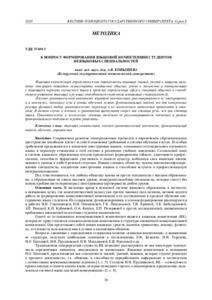Please use this identifier to cite or link to this item:
https://elib.psu.by/handle/123456789/25263Full metadata record
| DC Field | Value | Language |
|---|---|---|
| dc.contributor.author | Конышева, А. В. | - |
| dc.contributor.author | Konysheva, A. | - |
| dc.date.accessioned | 2020-07-02T07:02:16Z | - |
| dc.date.available | 2020-07-02T07:02:16Z | - |
| dc.date.issued | 2020 | - |
| dc.identifier.citation | Конышева, А. В. К вопросу формирования языковой компетенции студентов неязыковых специальностей / А. В. Конышева // Вестник Полоцкого государственного университета. Серия E, Педагогические науки. - 2020. - № 7. - С. 30-35. | ru_RU |
| dc.identifier.uri | https://elib.psu.by/handle/123456789/25263 | - |
| dc.description.abstract | Языковая компетенция определяется как совокупность языковых знаний, умений и навыков, овладение которыми позволяет осуществлять иноязычное общение устно и письменно в соответствии с языковыми нормами изучаемого языка в пределах определенных сфер и ситуаций общения и способствует развитию языковых и речевых способностей студентов неязыковых специальностей. Лексико-грамматический компонент языковой компетенции рассматривается не изолированно, а в комплексе, поскольку если в основе обучения лежит функциональный подход, то для конкретных речевых функций отбор грамматических структур и их лексического наполнения происходит в единстве. В данном случае и лексика, и грамматика выступают скорее как единицы речи, чем как единицы языка. Грамматические и лексические единицы отдельно не рассматриваются, поскольку в рамках функционального подхода их трудно разделить.= In the article, language competence is defined as a set of language knowledge, skills and habits, which allow to fulfill foreign language communication orally and in writing in accordance with the language norms of the language studied within certain areas and communication situations and promotes the development of language and speech abilities of non-language students. The lexico-grammatical component of language competence is considered not in isolation, but in a complex, because if the training is based on a functional approach, then for specific speech functions the selection of grammatical structures and their lexical filling occurs in unity. In this case, both vocabulary and grammar act more as units of speech than as units of language. The article does not consider grammatical and lexical units separately because they are difficult to separate into pars in the frames of a functional approach. | ru_RU |
| dc.language.iso | ru | ru_RU |
| dc.publisher | Полоцкий государственный университет | ru_RU |
| dc.relation.ispartof | Веснік Полацкага дзяржаўнага ўніверсітэта. Серыя E, Педагагічныя навукі | be_BE |
| dc.relation.ispartof | Herald of Polotsk State University. Series E, Pedagogical Sciences | en_EN |
| dc.relation.ispartof | Вестник Полоцкого государственного университета. Серия E, Педагогические науки | ru_RU |
| dc.relation.ispartofseries | Серия E, Педагогические науки;2020. - № 7 | - |
| dc.rights | open access | ru_RU |
| dc.subject | Государственный рубрикатор НТИ - ВИНИТИ::ОБЩЕСТВЕННЫЕ НАУКИ::Народное образование. Педагогика | ru_RU |
| dc.subject | Языковая компетенция | ru_RU |
| dc.subject | Лексико-грамматический компонент | ru_RU |
| dc.subject | Функциональный подход | ru_RU |
| dc.subject | Обучение | ru_RU |
| dc.subject | Упражнения | ru_RU |
| dc.subject | Language competence | ru_RU |
| dc.subject | Lexico-grammatical component | ru_RU |
| dc.subject | Functional approach | ru_RU |
| dc.subject | Teaching | ru_RU |
| dc.subject | Exercises | ru_RU |
| dc.title | К вопросу формирования языковой компетенции студентов неязыковых специальностей | ru_RU |
| dc.title.alternative | To the Question of Forming Language Competentce to Students of Non-Language Specialities | ru_RU |
| dc.type | Article | ru_RU |
| dc.identifier.udc | 37.0913 | - |
| Appears in Collections: | 2020, № 7 | |
Items in DSpace are protected by copyright, with all rights reserved, unless otherwise indicated.
